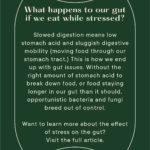The central nervous system, or vagal nerve, acts much like the federal government. It controls the body by setting governing laws and regulating accordingly. However, you also have a bundle of nerves called the enteric nervous system (ENS) that is attached to the gut and is responsible solely for digestion. Think of the ENS like a mayor of a city.
The vagus nerve and the enteric nervous system each have a lot of responsibilities, and they work both together and independently from one another: The mayor can set local rulings but has to abide by the jurisdiction of the federal government. In other words, your ENS responds to your thoughts, feelings, emotions, and most particularly, your stress responses. Therefore, if something is going on in your environment that is making you feel uncomfortable or afraid, the mayor doesn’t and cannot act – when there is a major stressor, the CNS (the federal government) takes over and tells the local government, “I need all your resources. You have no power right now.”
The ENS is then bumped offline by the federal government (the CNS) until the stressor is dealt with. Once it has, then the ENS (digestion) goes back online.

How stress affects the gut
If, and when, you’re in a stress situation, the central nervous system diverts resources to the places it needs most: your brain for quick thinking, your heart and lungs to pump oxygen and blood faster, and your muscles to run.
At the time of a stressful event, your body doesn’t need to be making hair and nails, replenishing skin cells, or even digesting. It needs to protect itself from danger and it knows how to do this by running or fighting. This requires significant energy resources, so it takes the enteric nervous system “off-line”.
This system is leftover from centuries of living in a world where getting breakfast could mean life or death. And while getting a bite to eat is much safer and easier nowadays, our ancient physiology hasn’t caught up with the modern world we live in. In today’s world, boops and beeps from our meetings calendar, constant pings from text messages, ever-growing traffic jams, pandemics, and world tensions are seen as threats. Not to mention held traumas.
If we cannot find a way to actively relax our body’s systems to feel safe, we stay in a constant state of alarm. This alarm keeps our body’s resources diverted and our digestion offline, or dramatically slowed which can lead to a whole host of health problems.

What happens when we eat while stressed out?
But a person’s got to eat — and stress-eat at that! So, we eat and drink anyway, regardless of whether we are relaxed or still stressed.
Slowed digestion means low stomach acid and sluggish digestive mobility (moving food through our stomach tract.) This is how we end up with gut issues. Without the right amount of stomach acid to break down food, or food staying longer in our gut than it should, opportunistic bacteria and fungi breed out of control. Meanwhile, parasites, viruses, and other microbiota can create a stronghold in our bellies resulting in stomach infections, inflammation, and altering our immune function.
Moving from the fight or flight alarm state to a rest and digest state is essential for gut health, and your overall well-being.This is why it’s essential to keep contact with the mayor in your gut, and make sure that he is responding the way that you and your body need. If you are suffering from digestion problems such as gas, bloating, constipation, or indigestion, it might be time to evaluate your stress levels and sources.
In the de-stressing section of the Your Daily™ Health Coaching app, we have exercises to help you reset your vagus nerve, to shift your mind and body out of fight or flight mode, and to minimize stressful triggers that could be slowing down your digestion. While healthy eating habits are important, controlling stress responses and relaxing our system, has immeasurable benefits for our gut health.
That being said, a Mindful Eating course is coming soon to Your Daily™, to help you improve your overall gut health and the communication pathways between your gut and your brain.
Read Next: Primary and Secondary Food











